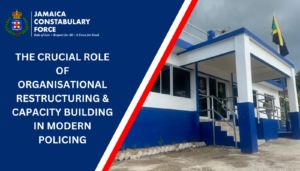
In this week’s edition of the “Commissioner’s Corner,” Police Commissioner Dr Kevin Blake delves into the third strategic priority of the Jamaica Constabulary Force (JCF)—Organisational Restructuring and Capacity Building. As the force confronts one of the most dynamic security environments in the region, this priority emerges as an administrative necessity and a fundamental reshaping of the Force to meet contemporary challenges effectively.
Form Follows Function – A Design Principle for Policing
Drawing from the architectural principle that “Form follows Function,” Commissioner Blake outlines the philosophical underpinnings of the JCF’s restructuring. He explains, “This simply means that the design of an artifact must be determined by its intended function,” applying this theory to the organisational design of the JCF. As the needs and functions of law enforcement evolve, so too must the structure of the organisation. This principle guides the JCF’s transformation, ensuring that its structure continuously aligns with its strategic functions and responsibilities.
Acknowledging the dynamic nature of security threats, Commissioner Blake emphasizes the necessity for the JCF to remain agile and responsive. “We operate in probably one of the most dynamic security environments in the region,” he notes, stressing that the traditional concept of law enforcement has expanded significantly. The restructuring initiatives are portrayed not just as responses to these changes but as proactive steps towards redefining the force’s functions to better address modern challenges.
Commissioner Blake outlines several significant restructuring initiatives that have taken place in the JCF that have been critical to the creation of the more modern Constabulary that we have today. It is worth taking time to unpack some of them.
Technology Integration
The establishment of a technology governance structure and the Technology Branch to enhance technological capacities was a pivotal move towards modernising the JCF. By enhancing technological capacities, the Force aims to streamline its operations, improve data management, and adopt advanced tools for crime fighting and community engagement. This strategic shift ensures that technology is not just an add-on but a central component of everyday policing, enhancing both efficiency and effectiveness in law enforcement practices.
Logistical and Developmental Enhancements
The creation of the Force Development and Logistics Portfolio (FDLP), focusing on transformation and logistical support was important for overseeing the JCF’s transformation and logistical support. This portfolio is designed to manage the complexities of modern policing logistics, from the deployment of resources in critical situations to the maintenance of operational readiness. Its role is to ensure that the JCF remains agile and well-prepared to respond to both routine public safety needs and critical incidents.
Infrastructure and Resource Management
Expansion of the Property Management and Maintenance Division (PMMD) and restructuring of the Transport Management and Maintenance Division (TMMD) were strategic moves aimed at optimizing the physical and logistical assets of the Force. These initiatives are intended to ensure that all operational facilities and vehicles are maintained to high standards, supporting the overall functionality and responsiveness of the JCF. Proper management of these resources directly impacts the efficiency of the force’s response to public needs and emergencies.
Expanding the Counter-Terrorism & Organised Crime Branch
The introduction of the Firearms and Narcotics Investigation Division (FNID) marks a significant evolution in the JCF’s approach to combating two of the most critical elements that fuel crime and violence: illegal arms and narcotics. Commissioner Blake points out the potential of FNID to “execute the functions involved in ridding our streets of illegal arms and narcotics.” The establishment of FNID addresses a core source of violence and criminal activity, aiming to disrupt the flow of illegal weapons and drug trafficking that threaten community safety.
The FNID is poised to have a transformative impact on the crime landscape in Jamaica. By focusing specialised resources and expertise on firearms and narcotics, the JCF can more effectively dismantle networks that operate within and across borders, reducing the availability of guns and drugs on the streets. This targeted approach not only helps in immediate crime reduction but also in stabilising communities plagued by drug-related violence and gun crimes, ultimately contributing to longer-term societal peace and safety.
Capacity Building as a Parallel Track
Understanding that structural change must be complemented by personal development, the Commissioner highlights the importance of equipping officers with the necessary tools, skills, and knowledge. “These changes…require that we must simultaneously ensure that we are equipped with the necessary tools skills and knowledge to deliver our services under these new structures,” he asserts, indicating a holistic approach to capacity building that encompasses both structural and personal development components.
Each of these strategic initiatives introduced by Commissioner Blake is designed to build a stronger, more responsive, and efficient police force. By focusing on technology, logistics, infrastructure, and specialised divisions like FNID, the JCF is adapting to the modern demands of law enforcement. The FNID, in particular, represents a hopeful and aggressive step towards addressing the root causes of crime, promising a safer future for the citizens of Jamaica. Through these efforts, the JCF is addressing current challenges as well as preparing for future demands, ensuring it remains at the forefront of effective policing.
Through this strategic focus on organisational restructuring and capacity building, Commissioner Blake not only reaffirms the JCF’s commitment to adapt and evolve but also sets a blueprint for how modern law enforcement organisations, particularly those in the Caribbean, can effectively respond to the complexities of contemporary policing challenges.







